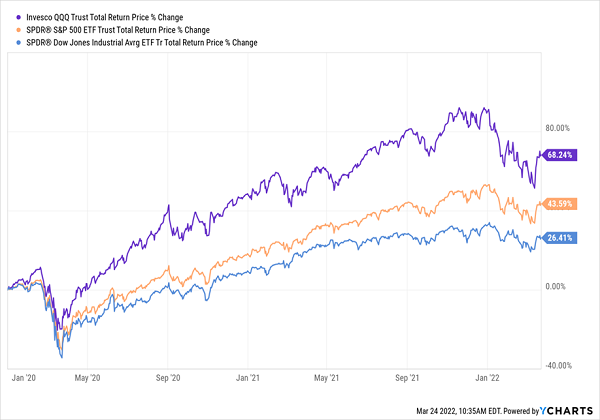If you’re like most investors I hear from these days, you’re suffering from a serious case of market vertigo.
On the one hand, stocks have posted strong gains over the last couple of years: with an annualized average return of over 19% since the start of 2020, the main US indices are up over double their long-term average of 7.5%.
Stocks Soar—Even With The Early 2022 Dive

But of course, the last two months have been stomach-churning, and more pullbacks are likely: the Fed has made no bones about the fact that it plans to raise rates quickly. And while the US economy recently cracked $24 trillion in annual GDP, an impressive 10.5% jump from before the pandemic, that’s still short of the 19% rise in stocks in that time. That gap is an air pocket that could send stocks tumbling.
How We’ll Get A 7.6% Dividend And Lower Volatility (From Blue Chip Stocks)
There are many ways to respond to this situation, but the absolute worst one is selling and going to cash! Doing so amounts to a double loss: first, we lose our dividends. And second, we expose ourselves to inflation, which is still over 7% and likely to stay above 5% for the rest of the year.
Fortunately, there’s a way for us to keep our stock exposure, cut our volatility and bag dividend payouts mainstream investors can only dream of: a 7.6% average yield, to be precise. And here’s the kicker: this approach lets us continue to hold the big-name stocks we already own!
The wonderful assets that let us pull this off are CEFs that sell covered calls. I know that sounds complicated, but stick with me because the strategy these funds use to protect and grow our investment, while boosting our income, is actually pretty simple. (And we’ll discuss four of these funds yielding 7.6%, on average, in just a second.)
As the name says, these funds sell covered calls on their portfolios. These are a type of contract that gives speculators the option to buy our CEFs’ stocks in the future, at a set price stipulated in the contract. In exchange, the speculators hand over cash, which the funds give us in the form of dividends.
There are two ways for these deals to play out: either the stock hits the price—called the "strike price" in option-speak—and gets sold (or "called away"), or it doesn’t, and the fund keeps it. The key is that the fund gets to keep the amount it charges (called a "premium") either way!
That’s how these funds pay us outsized dividends. And because they’re getting more of their return in cash, their portfolios tend to be more stable than those of, say, an index fund.
A 4-Fund Portfolio For 7.6% Dividends And "Crash Protection"
Three funds form the core of our portfolio: the Nuveen Dow 30 Dynamic Overwrite Fund (NYSE:DIAX), the Nuveen S&P 500 Dynamic Overwrite Fund (NYSE:SPXX), and the Nuveen NASDAQ 100 Dynamic Overwrite Closed End Fund (NASDAQ:QQQX).
These CEFs hold shares in all of the companies in the Dow Jones Industrial Average, the S&P 500 and the NASDAQ 100, respectively, so you’ll be diversified across hundreds of firms while holding mainstays like Apple (NASDAQ:AAPL), Microsoft (NASDAQ:MSFT), Johnson & Johnson (NYSE:JNJ), ExxonMobil (NYSE:XOM), UnitedHealth Group (NYSE:UNH), and Goldman Sachs (NYSE:GS).
These three funds’ savvy strategy, plus their top-quality holdings, have helped them post strong annualized returns over the last decade, as you can see below:

Source: CEF Insider
These three funds give us a nice downside hedge on their own, but let’s add another CEF that goes further: the First Trust High Income Long/Short Closed Fund (NYSE:FSD), which yields 9.4% and acts like a hedge fund—an asset the ultra-rich have tapped for decades.
Like hedge funds, FSD combines ownership in stocks with short positions in other stocks to protect our capital. You’re getting a massive income stream, too, and you’re getting it at a low price: FSD trades at a 9.3% discount to net asset value (NAV, or the value of the holdings in its portfolio), meaning you’re getting its assets for less than you would if you were to buy them yourself.
Put together, the discounted hedge from FSD and the built-in insurance from the three covered-call funds above put you in a much better position than going to cash. The best part? Their 7.6% average dividend, of course, which you can pocket while you wait for market volatility to ebb.
Disclosure: Brett Owens and Michael Foster are contrarian income investors who look for undervalued stocks/funds across the U.S. markets. Click here to learn how to profit from their strategies in the latest report, "7 Great Dividend Growth Stocks for a Secure Retirement."
